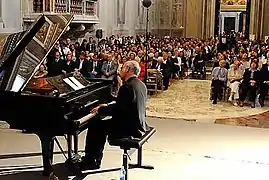Official Classical Singles Chart
The Official Classical Singles Chart was a record chart based on downloads and streaming of classical music in the United Kingdom.[lower-alpha 1][lower-alpha 2] Each week's chart was compiled by the Official Charts Company (OCC) and was first published on Monday afternoon on their official website. The chart ran for 140 weeks from 2012 to 2015, during which time a total of 23 singles by 22 artists reached number one. The most successful artist was the Italian pianist Ludovico Einaudi, who topped the chart with three singles for a total of 54 weeks, while the most successful record label was Decca Records, which spent 89 weeks at number one with six singles. Einaudi's track "I Giorni" from his album of the same name spent 51 weeks at number one, longer than any other single. In January 2013, following the release of Einaudi's album In a Time Lapse, singles by the pianist accounted for 13 of the Top 20 on the Official Classical Singles Chart.[3] Martin Talbot, managing director of the OCC, described him as one of the chart's "biggest and most consistent stars".[4]

Singles would often top the chart as a result of exposure in popular media, including films such as Fifty Shades of Grey, The Dark Knight Rises and Man of Steel.[5][6][7] In July 2012, a rendition of Spem in alium by the Tallis Scholars topped the chart following its usage in Fifty Shades of Grey.[8] E. L. James, author of the original novel on which the film was based, said that she was delighted that her readers had been introduced to the piece of music, and that it was a "deserved number one".[5] Three weeks later, the London Symphony Orchestra reached number one after their version of "Chariots of Fire" by Vangelis was used in the 2012 Summer Olympics opening ceremony.[9] Three of the top five singles on that week's chart were related to the 2012 Summer Olympics.[10]
Reaction to the Official Classical Singles Chart was generally positive. Tenor Russell Watson described it as "absolutely amazing", while the New Zealand soprano Hayley Westenra said that she was "really excited" about the chart's launch.[11] Composer Paul Mealor described the chart as "absolutely fantastic".[12] Conversely, Mike Spring, sales manager at Hyperion Records, was more skeptical, as he had observed that downloads of classical music had mainly comprised whole albums or works, rather than individual singles. Similarly, Anthony Anderson, managing director of classical music record label Naxos UK, stated: "By its nature, this chart will be more relevant to other companies."[13]
Chart history
"The new Official Classical Singles Chart is designed to reflect the changing ways in which classical fans are buying their music – track by track, as well as album by album. Coming just five months after the Military Wives became the first classical choir to top the Official Singles Chart, this launch further underlines how classical music is reaching into the mainstream."
— Official Charts Company managing director Martin Talbot[14]
The Official Classical Singles Chart was launched in 2012. According to Umusic, the official website for Universal Music in the UK, it reflected a shift in the British public's consumption of classical music from albums to tracks.[15] At the time of the launch, classical music was becoming more popular in the UK; the previous year, download sales of individual classical tracks had increased by 46% (from 834,000 to 1.2 million),[16] while the single "Wherever You Are" by Military Wives had been the 2011 UK Singles Chart Christmas number one.[12] During 2012's first quarter, approximately 284,000 classical music downloads were purchased in the UK, an increase of 34% compared to the same period the previous year.[17] Alongside the new singles chart, the Classic Brit Awards announced at the same time that it would launch a Top Single Award at the 2012 ceremony to commemorate the most popular classical single that year.[14]
The first chart was published on 28 May 2012, and was based solely on downloads of classical singles in the UK. At number one was a version of the UK's national anthem, "God Save the Queen", by the BBC Concert Orchestra and the British conductor Barry Wordsworth, which reached the top during the week of the Diamond Jubilee of Elizabeth II.[18] From 27 June 2014, streaming counted towards the UK's music charts, including the Official Classical Singles Chart, with 100 streams equating to one download.[19] The first number one under this new methodology was "Nessun dorma" by Luciano Pavarotti.[20] After nearly three years of publication, the chart was retired in February 2015, with its final number one being "I Giorni" – lack of media interest was cited as the reason for its dissolution. Reflecting on the chart later that year, Phillip Sommerich of Rhinegold Publishing felt that its retirement spoke to the difficulty in generating excitement in the UK's classical music sector.[21]
Number ones
| No. | nth song to top the Official Classical Singles Chart |
|---|---|
| re | Return of a single to number one |
| Contents |
|---|
| 2012 • 2013 • 2014 • 2015 |
By artist


Six artists spent five or more weeks at the top of the Official Classical Singles Chart.
| Artist | Number ones | Weeks at number one |
|---|---|---|
| Ludovico Einaudi | 3 | 54 |
| Luciano Pavarotti | 1 | 31 |
| Hans Zimmer | 5 | 23 |
| London Symphony Orchestra | 1 | 5 |
| Simon Rattle | 1 | 5 |
| John Williams | 1 | 5 |
By record label
Five record labels spent five or more weeks at the top of the Official Classical Singles Chart.
| Record label | Number ones | Weeks at number one |
|---|---|---|
| Decca Records | 6 | 89 |
| Reprise Records | 1 | 16 |
| Sony Classical Records | 4 | 9 |
| Sony Music | 1 | 5 |
| UMC | 1 | 5 |
Data sources
The Official Classical Singles Chart was compiled by the OCC using download and (from June 2014) streaming data from the following music sources:[14][19]
Websites
Streaming services
Notes
- At the time of the chart's launch, a digital audio track was eligible to count as a single only if it was sold for at least £0.40 and was no longer than 15 minutes.[1]
- The OCC used the term classical in a broad sense to represent a wide genre of music. Singles generally qualified for the chart if they were "composed by recognised classical composers and/or in a publicly recognised classical idiom or form", and were "capable of live performance in a concert setting". For singles of ambiguous genre, the OCC referred to the Classical Advisory Panel.[2]
- The artist, album, record label, date of reaching number one and number of weeks at number one are those given by the OCC.[22]
References
- Masterton, James (2014). "Timberlake, Justin". The Top 40 Annual 2013. James Masterton. p. 280. ISBN 9781310503368. Archived from the original on 17 November 2018.
- Ireland, Jane (10 June 2015). "When Is a Classical Album Not a Classical Album?". The Huffington Post. Archived from the original on 17 November 2018.
- "Ludovico Einaudi sets new chart record for a classical artist". London: Musicroom. January 2013. Archived from the original on 18 January 2018.
- "Einaudi's digital sales break classical record". London: Classic FM. 28 January 2013. Archived from the original on 31 January 2013.
- "Fifty Shades of Grey helps The Tallis Scholars top the classical music chart". London: Rhinegold. 12 July 2012. Archived from the original on 18 January 2018.
- "The Dark Knight rises to the top of the Official Classical Singles Chart". London: Official Charts Company. 30 July 2012. Archived from the original on 20 October 2017.
- "Man of Steel dominates Official Classical Singles Chart". London: Official Charts Company. 24 June 2013. Archived from the original on 24 June 2017.
- "'50 Shades' Seductive Spem tops the charts". Cambridge: Hazard Chase. 27 July 2012. Archived from the original on 27 March 2013.
- "Classical music features in Olympic ceremony". London: Classic FM. 30 July 2012. Archived from the original on 15 May 2015.
- "LSO and Vangelis top classical singles chart". London: Classic FM. 6 August 2012. Archived from the original on 8 August 2012.
- "Official Classical Singles Chart to Launch Next Week 23-05-12 | Official Charts". London: Official Charts Company. 23 May 2012. Archived from the original on 18 January 2018.
- "The UK's first Official Classical Singles Chart to launch next week". London: Official Charts Company. 24 May 2012. Archived from the original on 22 October 2012.
- "Classical singles chart greeted with scepticism by industry". London: Rhinegold. 12 February 2012. Archived from the original on 18 January 2018.
- "Classical singles to get official downloads chart". The Daily Telegraph. London. 24 May 2012. ISSN 0307-1235. OCLC 613316876. Archived from the original on 31 May 2012.
- "The Streaming Chart". London: Umusic. 4 July 2012. Archived from the original on 5 February 2013.
- Turner, Robin (10 December 2012). "Only Boys Aloud knock Luciano Pavarotti off top of classical chart". Cardiff: WalesOnline. Archived from the original on 18 January 2018.
- "Official Classical Singles Chart to launch 1pm Monday". Music Week. 24 May 2012. ISSN 0265-1548. OCLC 60620772. Archived from the original on 18 January 2018. (subscription required)
- Kreisler, Lauren (28 May 2012). "God Save the Queen is UK's first Official Classical Singles Chart Number 1". London: Official Charts Company. Archived from the original on 22 October 2012.
- Pentreath, Rosie (27 June 2014). "Music streaming to be counted in the classical chart". BBC Music Magazine. Archived from the original on 18 January 2018.
- "22 June 2014 – 28 June 2014". London: Official Charts Company. June 2014. Archived from the original on 23 January 2018.
- Sommerich, Phillip (1 September 2015). "Streaming is leaching revenue from classical labels. But does the industry have the clout to make the necessary changes?". London: Rhinegold. Archived from the original on 18 January 2018.
- "Official Classical Singles Chart Top 20". Official Charts Company. 2015. Archived from the original on 2 July 2017. (Customise archive search by altering the "change date" setting)